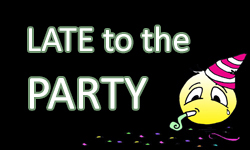 It’s
It’s
another Late to the Party, right on
time. I’ve spent the last couple editions of my cinematic catch-up saga going
over my history as a film geek, and my introduction to the worlds beyond the
PG-rated and the popcorn. It’s high time I returned to the present, to expose
the shame that lingers with me in the form of the long list of stuff I haven’t
yet seen.
As
always, epithets can be hurled at me via e-mail: iandonnell@gmail.com. I
respond politely to abuse.
 Die Hard
Die Hard
I was
five years old when Die Hard made its theatrical debut. That doesn’t necessarily
preclude my having caught in the theaters; I had a friend who, by the age of
seven, had been subjected to Alien, Aliens, Die
Hard, Dirty Harry, and any number of other violent, awesome flicks. This
was at a time when
dared to watch.
As a
child, I was a pussy. (Now that I am a man, I know how to exploit words like
"sensitive" and "artistic temperament" to justify my
entertainment preferences, but the fact is all that has really changed is my
vocabulary.) That was something of an intentional decision on the parts of my
parents, withdrawing things of questionable moral value from my life until I
had arms long enough to pull them down for myself. In fourth grade, when Die
Hard came out, I had shrimpy arms.
Not so
with my friend Aaron, whose father practically insisted on Basic Instinct during
family night. Aaron was a school friend; we would hang out during recess and
choose each other as partners during group activities, but I rarely saw him
outside of the classroom. The first time I got to visit his house was an
education. I learned about how the bypass most of Super Mario Bros. 3; I
learned how a silencer works; and I heard the word "motherfucker" for
the very first time.
A child’s
introduction to profanity isn’t something to be taken lightly. Curse words are
a glorious tool, in the mouths of babes, for nonviolent rebellion. Imagine
having grown up on what you believed was a complete mode of expression, and then someone introduces you to a
few new emotions you hadn’t yet been able to encapsulate in words within the
confines of your own brain.
Yeah,
"Yippee ki-yay, motherfucker" was something of a turning point in my
life, long before I even watched the movie from which it originated. Consequently,
I regarded Die Hard fondly all through my childhood, despite having
watched it for the first time just a few days ago. Because of its immense
popularity in my generation — and in the generation just preceding mine, whose
opinions I have occasionally been known to ape — the entire movie was spoiled
for me, going in. There wasn’t a plot point or action sequence that hadn’t been
explained to me, in passing and in great detail.
I think
it’s worth my spending a little time to discuss my position on spoilers, seeing
as how being late to the party on so many films nigh guarantees that you’ll
encounter some — in my case, several that I wish I hadn’t heard. Bits of films
enter popular culture, and no amount of careful browsing can protect you from
‘ironic’ posts containing such beauties as: "Bruce Willis is a
ghost!" There are a few movie experiences for which I wish the mystery had
been preserved, but generally I don’t give a rat’s about plot revelations. Plot
is only one of a number of tethered components in good filmmaking, and knowing
some tidbits from the story has never ruined the quality of a film for me. The
impact, maybe, but not the quality.
That’s
all good for me, of course, given that I’ve got a list a mile long of films to catch
up on; I already know the plots for roughly two-thirds of those. So, what
concerns me — especially in this column — is how fresh the experience of a film
can be, despite having been a small facet of my life and linguistics since
childhood.
At least
in Die
Hard‘s case, that concern hasn’t got a leg to stand on. I’ve seen (and
enjoyed) other John McTiernan films, but after a single viewing I don’t think
he’s even come close to topping the adventures of John McClane. I’m going to
list off the things that I loved, just so you readers can have the chance to
nod sagely and prepare to welcome me into the fold. The kinesis in the action
sequences was perfect, with a believable momentum thanks largely, I suspect, to
the editing of John F. Link and Frank J. Urioste. The quips and one-liners scored
each and every times. The occasionally outrageous dialogue gets sold entirely
by the cast. Alan Rickman is very much like god.
I love
watching reference point movies, the ones that crystallize whatever has preceded
them and stand as pinnacle for all those that follow.
for the sci-fi. Now that I’ve seen Die Hard, I’m becoming aware of all
the debts owed it by other weightless, tense American action since 1988. It kinda
feels like going to grandpa and learning what WWII was like, straight from the
mouth of someone who was there. Now I can contribute authentically to discourse! God, that makes me happy.
It’s
always fascinating to me to see which bits of cinema survive in the public
mind. In the case of retooled noir, why does
public perception than The Conversation? Using public
sentiment as an endorsement for artistry never works well; but, from time to
time, the populace and the pretentious (I mean me, in this case) come into
alignment. Die Hard is going to survive a good, long time, for so many
more reasons than its plot.
Fuck,
yeah.